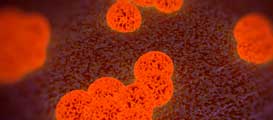Overview
 Worldwide, it is estimated that between 2 million and 53 million people carry Methicillin-resistant Staphylococcus aureus (MRSA) and rates are increasing rapidly. This makes MRSA the most commonly identified, antibiotic-resistant pathogen in Europe, the Americas, North Africa, the Middle East and Asia.
Worldwide, it is estimated that between 2 million and 53 million people carry Methicillin-resistant Staphylococcus aureus (MRSA) and rates are increasing rapidly. This makes MRSA the most commonly identified, antibiotic-resistant pathogen in Europe, the Americas, North Africa, the Middle East and Asia.
The Problem
Patients infected with multi-drug resistant organisms, such as MRSA, are likely to have longer and more expensive hospital stays, and may be more likely to die as a result of the infection. MRSA is problematic in healthcare facilities where patients with open wounds, invasive devices and weakened immune systems are at greater risk of infection than the general public.
Consequences
The multi-drug resistance capability of MRSA means there are limited treatment options and Vancomycin is often the last line of defense against the infection. Continued inappropriate use and overuse of Vancomycin makes it inevitable that resistance will emerge, and Vancomycin-resistant MRSA has been reported in some countries
Rapid Testing
It is essential that MRSA infections are identified as early as possible and steps are taken to ensure the correct treatment is implemented. Rapid MRSA testing aids in reducing the empirical use of Vancomycin and permits cost-effective decisions for optimal patient management.
The new Alere™ PBP2a Culture Colony Test is a rapid immuno-chromatographic assay that uses monoclonal antibodies to assist in the detection of MRSA directly from bacterial isolates in five minutes. In a U.S. study, results were available at least one day sooner than standard antimicrobial susceptibility tests, and were used to effectively modify and improve treatment regimens for patients with S. aureus infections.
Antimicrobial Stewardship Program Diseases
Featured Product

AlereT™ PBP2a Culture Colony Test
AlereT PBP2a Culture Colony Test is a cost-effective, targeted approach to aid in the detection of methicillin-resistant Staphylococcus aureus (MRSA).